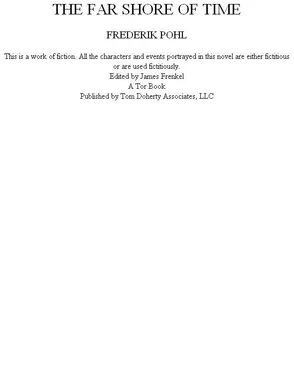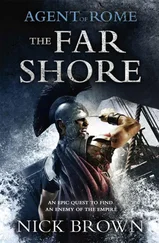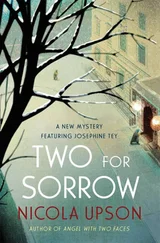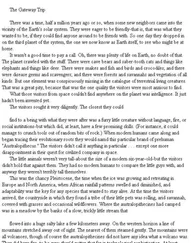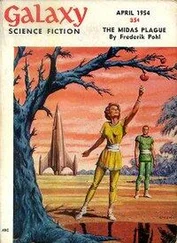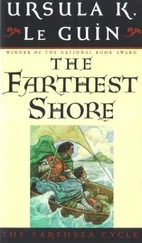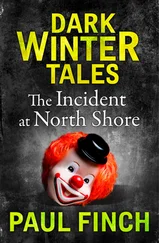Pohl, Frederik - The Far Shore of Time
Здесь есть возможность читать онлайн «Pohl, Frederik - The Far Shore of Time» весь текст электронной книги совершенно бесплатно (целиком полную версию без сокращений). В некоторых случаях можно слушать аудио, скачать через торрент в формате fb2 и присутствует краткое содержание. Жанр: Старинная литература, на английском языке. Описание произведения, (предисловие) а так же отзывы посетителей доступны на портале библиотеки ЛибКат.
- Название:The Far Shore of Time
- Автор:
- Жанр:
- Год:неизвестен
- ISBN:нет данных
- Рейтинг книги:3 / 5. Голосов: 1
-
Избранное:Добавить в избранное
- Отзывы:
-
Ваша оценка:
- 60
- 1
- 2
- 3
- 4
- 5
The Far Shore of Time: краткое содержание, описание и аннотация
Предлагаем к чтению аннотацию, описание, краткое содержание или предисловие (зависит от того, что написал сам автор книги «The Far Shore of Time»). Если вы не нашли необходимую информацию о книге — напишите в комментариях, мы постараемся отыскать её.
The Far Shore of Time — читать онлайн бесплатно полную книгу (весь текст) целиком
Ниже представлен текст книги, разбитый по страницам. Система сохранения места последней прочитанной страницы, позволяет с удобством читать онлайн бесплатно книгу «The Far Shore of Time», без необходимости каждый раз заново искать на чём Вы остановились. Поставьте закладку, и сможете в любой момент перейти на страницу, на которой закончили чтение.
Интервал:
Закладка:
That’s what I tried.
It didn’t work very well. Green-glass didn’t want questions from me. Green-glass wanted only facts. The first couple of times I tried throwing in a question it simply ignored what I asked. Then it instructed me to stop doing that. And then it got worse.
See, I couldn’t stop. I was convinced that I had no other way of gaining information, and I kept on doing it, and so the Christmas tree took its inevitable next step.
That was the second time I got the helmet. It was just as agonizing as before; but it had a surprising result.
I expect I screamed a lot. When Green-glass at last took the helmet off my head and I lay there, shaken and miserable, I saw that something had changed. One of the room’s doors had opened. Something I had never seen before was looking in at us.
It was a pretty hideous specimen.
What it looked like, more than anything else, was a scaled-down model of one of the dinosaurs I’d seen in the museums when I was a kid-an apatosaurus, they called that kind-only this one was standing on its hind legs and wearing a kind of lavishly embroidered jogging suit. Its arms weren’t like a dinosaur’s, though. They were lightly furred and as sinuous as an elephant’s trunk, and so was its long, long neck, with a little snaky head at the end of it that darted around inquisitively. It had a round little belly that was covered by a circular patch of embroidered gold-it almost looked like a particularly fancy maternity dress-and I recognized it at once from the pictures Dopey had shown us when we were his captives.
It was the Enemy. I guess my screaming had attracted it, and so I was in the presence of a living, breathing Horch.
When the Horch entered the room the Christmas trees stopped what they were doing, their twiglets turning deferentially toward it. It did not speak to them. It came toward me, arms and neck swaying, and it darted its little head at my face, sniffing and staring into my eyes. Then the long neck whipped the head away and the creature turned toward the door to the biological-needs room. The door opened at once and the Horch passed through, followed by the rosy-pink robot.
What they were doing there, I could not see, though I could hear sounds from inside the room. The Horch and the Christmas tree were twittering to each other, though I couldn’t make out the words. There was something else going on, too: squeaking, gasping noises I couldn’t identify. Then the Horch came back into the interrogation room, didn’t speak, simply left it again through one of the other doors, with that long neck curved back and the snaky little eyes peering at me.
Rosy-pink buzzed back on its little roller-skate wheels to where I lay. It didn’t comment on the visit from the living Horch. It didn’t resume the questioning, either. “Attend now to your biological needs,” it said, and that was the end of that session.
The mystery sounds had come from Dopey. He wasn’t alone, either. A bronze-colored Christmas tree was holding him down while a pale yellow one was doing some obviously painful things to him.
It looked like a torture session to me, and that was both surprising and wrong. I mean sinfully wrong, a violation of order and propriety. Interrogations didn’t take place in the biological-needs room! No prisoner likes to see changes in the rules, because changes are almost always bad, so I squawked a feeble sort of protest. It didn’t go any further than that. The pale yellow one extended a clutch of branches menacingly in my direction, and I took the hint. I shut up. I couldn’t help watching, though. Every time the machine touched Dopey he twitched and squeaked in pain, though they weren’t asking him any questions. Then, abruptly, they released him and rolled out of the room.
As soon as they were gone I knelt beside Dopey. He was breathing hoarsely, obviously hurting. “Are you all right?” I asked.
He turned the kitten eyes on me. “No, Agent Dannerman, I am not all right,” he gasped. “Leave me alone.”
I couldn’t do that. “Did you see that thing? It was a living Horch, wasn’t it?”
Dopey gave me a look of disdain. “Of course,” he said, pulling himself together. He stood up uncertainly, then limped toward the water jug.
I followed. “You weren’t surprised to see him?”
He took his time about answering, drinking from his little cupped hands. It seemed to revive him. “The Horch rule here,” he said, licking his lips. “What is surprising if one looks in on our interrogation? Did you expect it to be kinder than its machines?”
As a matter of fact, I had, sort of. “He looked like he was inspecting the way we were treated,” I said, unwilling to give up what little hope I could find. “I thought he might do something to help us, maybe.”
He gave me a look of contempt and said his favorite thing: “You are a fool, Agent Dannerman. Kindness from a Horch!”
“Not kindness,” I said stubbornly. “Common sense. If we get sick, we won’t be any good to them.”
“In which case,” he said, “they will simply scrap us and make new copies. Now I wish to sleep.”
He looked as though he needed it. “All right,” I said reluctantly. “I forgot they’d been torturing you.”
He gazed at me with an expression of blended contempt and woe. “Torturing me? No, Agent Dannerman, they were not torturing me. They were doing worse. They were giving me medical treatment to keep me alive. Now let me sleep!”
CHAPTER NINE
Day followed day, and the pointless, endless questioning went on, on the robots’ capricious choice of subjects. Childhood games: How many players were necessary for hide-and-seek? Were Little League baseball players paid like their adult colleagues? Theater: What had Christopher Marlowe written besides Dr. Faustus and The Jew of Malta? What was the function of the chorus in Greek drama?
Those questions puzzled me at first. I certainly knew a lot about theater, because that’s what I had majored in in college, but why did they ask me about the parts I didn’t know instead of the early-twentieth-century playwrights I had studied?
It took me several days to figure it out, and when I did the answer gave me no pleasure. The robots had asked all the obvious questions already, but they had asked them of some other Dan Dannerman. As Dopey had said, now they were simply filling in the gaps that remained.
Along about then that living Horch dropped in again on my interrogation. This time he didn’t come alone.
The Horch who came with him was female. There was no doubt about that. The evidence was clear, because she was suckling an infant Horch with one pendulous breast, though otherwise the two adults were hard to tell apart. They both wore the colorful jerkins, with soft, flexible half-sleeves over their snaky arms. The only difference in their costumes was that her belly was covered not by embroidered fabric but by a shiny metal dome, almost like a medieval knight’s helmet if it hadn’t been on (he wrong part of her anatomy. When the infant released her breast it dangled over the metal dome until she tucked the breast away and slung the infant under one ropy arm, the baby’s little neck swinging foolishly around.
The interrogation had stopped, the robots standing silent and immobile. The two adult Horch paid them no attention. They conferred for a moment, snaky necks almost intertwined and the little rattlesnake heads so close together that I couldn’t hear anything. Then the female darted her head in my face. “The least grandson of the Two Eights, Djabeertapritch,” she said-I thought that was the name she used, as close as I could make it out-“is of the opinion that your physical state is deteriorating. Is that the case?”
I goggled at her. The last thing I had expected was that a Horch would concern itself with my physical state. While I was puzzling over that, the other Horch took a hand. “It is to your advantage to answer her, Bureau Agent James Daniel Dannerman,” he said. “Please respond.”
Читать дальшеИнтервал:
Закладка:
Похожие книги на «The Far Shore of Time»
Представляем Вашему вниманию похожие книги на «The Far Shore of Time» списком для выбора. Мы отобрали схожую по названию и смыслу литературу в надежде предоставить читателям больше вариантов отыскать новые, интересные, ещё непрочитанные произведения.
Обсуждение, отзывы о книге «The Far Shore of Time» и просто собственные мнения читателей. Оставьте ваши комментарии, напишите, что Вы думаете о произведении, его смысле или главных героях. Укажите что конкретно понравилось, а что нет, и почему Вы так считаете.
